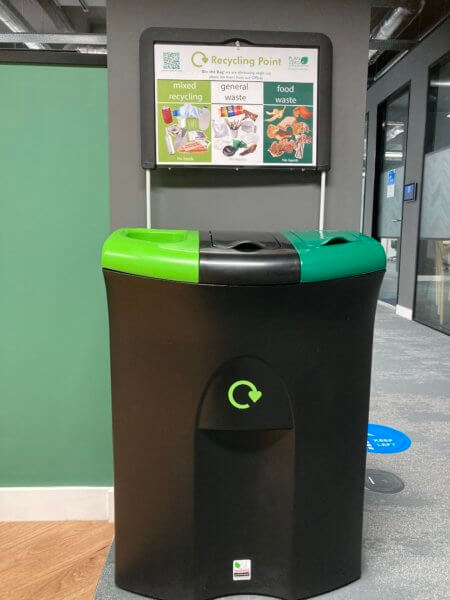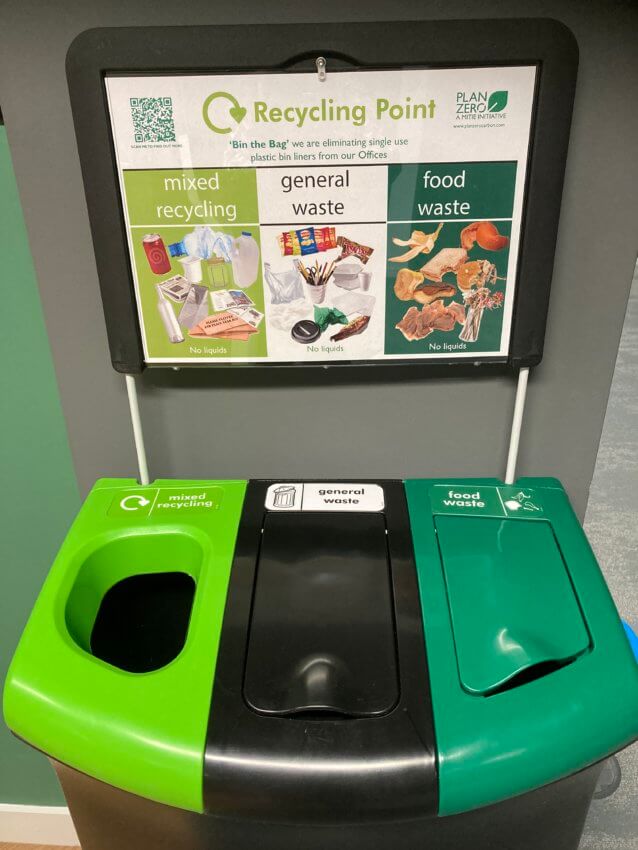9 ways to reduce office waste
Now more than ever, people are aware of the need to behave more sustainably and reduce our negative impact on the environment and climate. You may have made changes already, like switching to a less polluting car model, but what can you do to reduce the environmental impact of your life at work?
Every day, offices generate huge volumes of unnecessary waste. Most of it goes to landfill when it could be reused and repurposed. And with more people feeling strongly about sustainability issues, your employees will probably want to minimise the environmental impact of the work they do.

What can you do to reduce your office waste?
The world of work is becoming increasingly digitised, but daily office life still consumes a huge amount of resources. And it’s not just paper that we’re binning. Plastic bottles and single-use cups, broken electronic devices, waste food, packaging and much more all add to the pile.
With the ever-increasing urgency to look after our environment, it’s clear that organisations that want to reduce waste, in the office, need to do more than provide a few different bins.
At Mitie, we seek every opportunity to minimise our business waste. Following our merger with Interserve, we collected and recycled 10,000 bags of old uniforms and, through an innovative recycling project, saved 80 tonnes of material from going to landfill.
Here are nine practical ideas for how your organisation and employees can reduce waste in your office.
1. Appoint waste champions
Better sustainability and recycling practices are more likely to be adopted through peer encouragement rather than directives from management. Appoint a waste prevention team to champion green initiatives. They can help create a positive and inclusive culture and encourage people to work in more environmentally friendly ways.
2. Take a waste audit
A waste audit can help set a baseline and create benchmarks to track office waste. By doing this you can see whether people are recycling properly and set targets for waste reduction and recycling. But try to keep it light-hearted.
3. Start with small wins
Think about the small changes you can make in the office that will benefit staff and the organisation. If you find staff are having trouble knowing which bins to use for certain items, use signage to show what materials can go where. This will help them understand and give them more confidence to recycle.
4. Go paperless
There’s no reason why most organisations can’t ditch the paper habit in some way. Benefits include saving space that would normally be used to store paper stock, saving costs on printing, easier access to information online and increased productivity. It also offers great environmental benefits, like saving trees from the paper mill and reducing the amount of paper sent to landfill. And it all helps to reduce your organisation’s carbon footprint.
5. Eliminate single-use materials
Lunches at work really can be litter free and there’s no time to lose in reducing single-use items around the office. Investing in reusable cutlery, plates and cups eliminates the need for throwaway items. This helps embrace the circular economy and cuts down on waste produced in the office.
6. Provide filtered water
Plastic bottles are a huge generator of waste, with billions ending up in landfill. When it comes to plastic bottles, people in the office should be discouraged from using them and offered practical alternatives instead. One great way is to provide staff with filtered water and glasses, and even branded reusable water bottles. This leads to less waste and employees save money by not buying bottled water.

7. Compost
Food-related recycling can go much further than making sure packaging can be reused. Many organisations now have composting bins on their premises, where organic waste can be collected, then taken away to create useful fertilisers for agriculture. Waste food, napkins, tea bags and even the cup sleeves that come with your coffee, can all go straight in the composting bin and be put to good use elsewhere. Mitie helped Network Rail reduce the amount of food waste going to landfill by 80% which reduced the company’s carbon footprint and saved them money.
8. Offer incentives
Giving the workforce a recycling target adds a fun and motivating element to your waste reduction efforts. Challenge staff to pack a zero-waste lunch in containers rather than going to a supermarket and buying packaged foods. This will cut down on waste, eliminate the use of single-use items and embrace the circular economy.
9. Education is key
A lack of knowledge can often be the reason why unnecessary waste is created in the office and ends up in landfill. Staff training will not only benefit people around the office but also the organisation. Informative ‘Lunch and learn’ sessions, where staff can find out what can and can’t be recycled and how they can ditch single-use materials, are extremely useful. By taking time to educate staff in waste management, the organisation will experience better recycling rates and a reduction in waste, and staff will feel part of the solution not the problem.

Need further waste management support? Enquire with Mitie today!
Whatever the nature of your organisation, and whatever your waste management goals, Mitie has the services to help you, based on more than three decades of expertise. Take a closer look at our commercial recycling services, or for more specific advice and support, get in touch with our team today.
Read next
Mitie saves 80 tonnes of uniform from landfill with innovative recycling project
Mitie saves 80 tonnes of uniform from landfill with innovative recycling project

Case study: Rail company reduces food waste by 80%
Working in partnership with Mitie, Network Rail have installed a food waste digester that can convert food waste into biomass in just 12 hours.